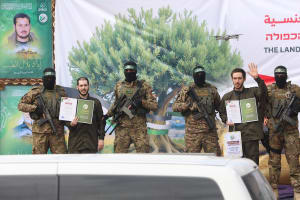Last 6 living hostages of ceasefire's first phase released by Hamas, return safely to Israel
Israel delays prisoner release, weighs further steps

Israeli citizens Tal Shoham, Omer Shem Tov, Omer Wenkert, Eliya Cohen, Avera Mengistu and Hisham al-Sayed were released from captivity in Gaza by the Hamas terrorist organization on Saturday and returned to Israel to reunite with their families.
“Our hearts are bursting with excitement, and we embrace the families. Their return is a moment of joy and relief for their families and for all of Israel,” Prime Minister Benjamin Netanyahu stated in the evening.
Saturday’s round of releases, the last planned in the current phase of the hostage deal, was the largest and most complicated to date.
The six hostages were released at three different times from separate locations.
Most of the hostages emerged somewhat frail and had lost a substantial amount of weight. Hamas again staged elaborate “release ceremonies,” parading the hostages on stage and forcing some of them to speak to the crowds.
The first to be released were Tal Shoham, who was forced to speak on stage, and Avera Mengistu. Both were then transferred to the International Red Cross in the southern town of Rafah.
Shoham (39) is a dual Israeli-Austrian citizen who lives in northern Israel, but on Oct. 7, he was at Kibbutz Be’eri to celebrate the holiday with his wife’s family.
Tal Shoham, smiling in a way only his wife, kids, and family could make happen. pic.twitter.com/gWmKmFRIEE
— Israel Defense Forces (@IDF) February 22, 2025
Large parts of his extended family, including his wife, children, mother-in-law and others, were taken hostage but released in November 2023.
Mengistu (37) suffers from mental illness and crossed into Gaza of his own accord in 2014. Hamas has since held him captive, sending almost no signs of life over the past 10 years.
Avera is home.
— Israel Defense Forces (@IDF) February 22, 2025
After over a decade in captivity Avera can start his healing journey surrounded by his family ❤️ pic.twitter.com/THui2FWNNl
The next release was carried out in Nuseirat, an area the IDF didn’t enter in force during the war. Hostages Omer Shem Tov (22), Omer Wenkert (23) and Eliya Cohen (27) were forced to wave and give short speeches before the Red Cross took them to a handover point in Gaza.
Omer Shem Tov is home.
— Israel Defense Forces (@IDF) February 22, 2025
After 505 days, Omer is back in Israel and finally reunited in the arms of his parents. pic.twitter.com/ZU5MQLjHd1
All three had been kidnapped at the Nova rave party in Re’im on Oct. 7, 2023.
The last hostage to be released was an Arab-Israeli man, Hisham Al-Sayed (37), from the Bedouin village of Hura in the Negev Desert. Like Mengistu, he also suffers from mental illness and entered Gaza in 2015.
His release was carried out in Gaza City, without any ceremony which, according to Hamas, was done to express the group’s respect for the Palestinian people.
A short while ago, the returning hostage Hisham al-Sayed crossed the border into Israeli territory accompanied by IDF and ISA forces, and he is currently on his way to an initial reception point in southern Israel, where he will be reunited with members of his family. pic.twitter.com/A3RUU0Ezd9
— Israel Defense Forces (@IDF) February 22, 2025
The IDF in response stated, “Where was this “respect” for the Arab-Israeli community when they held Hisham hostage for over a decade? Or kidnap and murder many Arab-Israelis on October 7?”
Like in previous rounds, after their release, all hostages were handed over to IDF troops in Gaza, who then took them to a reception point in Israel for their first reunions with family members before they were flown to a hospital by helicopter.
“So far, we have brought 192 hostages back to Israel. Of these, 147 are alive and 45 are deceased,” Netanyahu said in his statement following their release.
“There are still 63 hostages in the hands of Hamas. The government of Israel is committed to continuing to act with determination to bring all our hostages home – the living to the embrace of their families and the deceased to a proper burial in their homeland.”
Defense Minister Israel Katz said the return of the hostages was “an emotional and joyful moment for their families and for all of Israel,” However, he warned that the nation would not move on from the “horrific and vile” murder of Shiri, Ariel and Kfir Bibas, whose bodies were returned to Israel these past days.
In a possible first indication that Israel intends to respond to the revelation of the Bibas family’s brutal murder and the delay in the return of Shiri’s body, the release of the Palestinian prisoners planned for Saturday was delayed.
Israeli officials told Army Radio that a decision over the release would be postponed until the end of a security consultation, led by Netanyahu later in the evening.
“Regarding the delay in the release of the terrorists - upon the conclusion of the security consultation, a decision will be made regarding the continuation of the path, and the completion of the return of the deceased hostages at this stage,” Army Radio reported, citing an official.
The six hostages released on Saturday were the last living hostages remaining on the list of those planned to be freed during the first phase of the ceasefire deal. The phase will officially come to an end with the release of four additional hostages' bodies, which is planned for next Thursday.
As of Saturday evening, 63 Israeli hostages remain in captivity by Hamas in the Gaza Strip. The IDF estimates that 36 of them were killed in captivity.

The All Israel News Staff is a team of journalists in Israel.
You might also like to read this:














